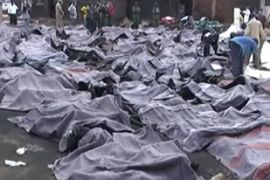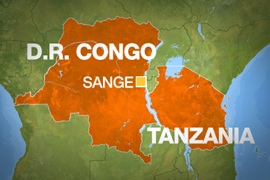Hundreds die in DR Congo fuel blast
Lorry carrying oil overturns and bursts into flames, engulfing the village of Sange.

“There was a crush [of people] and a petrol leak, [then] there was an explosion of fuel oil which spread throughout the village,” he said.
‘Completely destroyed’
Al Jazeera’s Malcolm Webb, reporting from the scene of the tragedy in Sange, said: “It is a large area of devastation. A [cinema] was crammed with people watching a World Cup match. The whole thing is now completely destroyed.
“Behind it, another cinema and a couple of houses have been completely burnt to ashes.
 |
“I am now two kilometres up the road from the scene where the UN and local Red Cross brought a lot of the bodies and are now burying them in mass graves.
“The are two large holes and then about three or four houses.
“It was a big fuel tank with a very large amount of fuel.
“People were apparently trying to get some of the fuel.
“Fuel is a valuable commodity here.
“This is one of the poorest parts [of the DRC], so people scrambled to try and get some. And then, 20 minutes or so after the truck tipped over, something triggered the explosion.
“By that point petrol had flown into both cinemas and to the houses behind.”
‘Trap already laid’
Earlier, Katrina Manson, a journalist with the Reuters news agency in the DRC, told Al Jazeera that once the fuel started leaking “it ran absolutely everywhere. Once it caught fire, the trap was already set”.
Dozens of homes, mostly constructed with earth and straw, were engulfed in the blaze.
| Africa’s fuel curse |
|
|
A police officer based in Bukavu, the provincial capital, said the accident had been caused by the lorry’s “excessive speed”.
Leonard Zigade, an official of the local Red Cross, said that the organisation had people on the spot and the search for victims was continuing.
The UN, for its part, made three helicopters available to evacuate residents and alerted hospitals at Bukavu and Uvira, a source said.
Madnodge Mounoubai, a spokesperson for the UN Organisation Stabilisation Mission in the DRC (Monusco), told Al Jazeera that about 35 people had been air-lifted to Bukavu for treatment.
Survivors “in the village need water, food and maybe psychological assistance”, he said.
“We have one helicopter on the ground ferrying the most injured people to Kivu. We also have a couple of ambulances transporting the injured to nearby hospitals.
“Bukavu is about 100 kilometres from Sange while Uvira is about 33 kilometres.
“But in either place we don’t have any special hospital to treat the injured.
“We are trying to get the best possible medical care that we can, but unfortunately there is no special unit for burned people.”
Monusco initially said that five peacekeepers were killed in the blaze, but later said there were no deaths.
 2006: A pipeline expodes near Lagos in Nigeria when it is opened to steal fuel, killing 284 people.
2006: A pipeline expodes near Lagos in Nigeria when it is opened to steal fuel, killing 284 people.